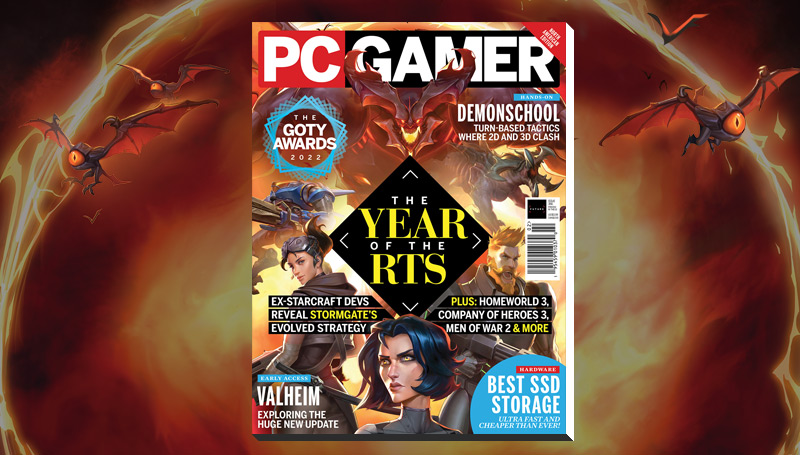



Hogwarts Legacy is currently the best-selling game on Steam, and with Deluxe Edition owners able to play early, it’s already the most popular game on Twitch in advance of its official release. At the same time, many gamers are pledging not to buy the open world Harry Potter game while encouraging others to reject it as well, and a conflict that has been fizzing on social media for years now is flaring into fights and accusations of bullying.
Resurfaced discourse about the wizarding world’s goblins and their resemblance to old antisemetic caricatures aside, the informal boycott has little to do with the contents of Hogwarts Legacy itself, which by many accounts (including our Hogwarts review) is a very good Harry Potter game. It’s all about Harry Potter creator JK Rowling.
The British author has spent the past several years protesting the legal and social acceptance of trans people, becoming a leading voice of anti-trans panic and influencing global politics with rhetoric that LGBT media watchdog GLAAD called “inaccurate and cruel” in 2020. The lead actors from the original films, Daniel Radcliffe, Emma Watson, and Rupert Grint, have all repudiated Rowling’s views, as has an actor who appears in Hogwarts Legacy itself. Meanwhile, Harry Potter fans alienated by Rowling’s entry into transphobic politics have had to make a choice: Should they abandon a world they love because of its creator?
How Rowling became an anti-trans figurehead
The focal point of Rowling’s anti-trans activity has been a 2020 essay (opens in new tab) in which the author claimed to sympathize with trans people while at the same time implying that trans women are men in “costume,” describing trans rights as a threat to “natal girls and women”—opposing Scottish legislation that would have made it easier for trans people to receive legal recognition of their gender—and suggesting that children are in danger of contracting a “social contagion” which causes “rapid-onset gender dysphoria.”
Scottish National Party activist Fiona Robertson called the essay and its effect “a perfect campaign in terms of radicalizing people” against trans people, telling Politico (opens in new tab) last year that Rowling’s influence gave uninformed observers permission to go “full in on the cruelty.”
Rowling’s essay has been extensively refuted and rebutted by experts and advocates. No medical organizations accept the speculative term “rapid-onset gender dysphoria” as a diagnosis, for instance. A number of institutions, including The American Psychological Association, have gone further, objecting to the term’s use (opens in new tab) on the basis that there are “no sound empirical studies” to support its existence and no evidence that it “aligns with the lived experiences of transgender children and adolescents.”

‘There has never been a verifiable, reported instance of a trans person harassing a cisgender person’ in a public restroom.
The Advocate
There’s also no evidence that legal gender recognition is dangerous to women, despite the past decade’s panicked introduction of “bathroom bills,” a type of law that bans trans people from using public restrooms which don’t align with the gender they were assigned at birth. Responding to a Texas bathroom bill in 2015, The Advocate (opens in new tab) reported that “there has never been a verifiable, reported instance of a trans person harassing a cisgender person” in a public restroom, and neither has there been a confirmed report of “male predators ‘pretending’ to be transgender to gain access to women’s spaces and commit crimes against them.”
Advocates argue that these discriminatory bills don’t make anyone safer, but do endanger trans people. “The fear of violence is already a daily reality for transgender people, and bills like these could very well make it unsafe for trans people to go out in public if they become law,” the ACLU said in 2016 (opens in new tab).

Undeterred by the criticisms of her essay (one person wrote a 28-point rebuttal (opens in new tab)), Rowling has continued her campaign against trans acceptance, and her views have been cited and mirrored by politicians. In 2020, for instance, a US senator quoted the author’s essay (opens in new tab) while blocking a civil rights bill. Most recently, the UK made an unprecedented move to block passage (opens in new tab) of the Scottish Gender Recognition Reform Bill that Rowling first opposed in her essay three years ago, and also attacked in The Sunday Times Scotland (opens in new tab) last year.

To play or not to play Hogwarts Legacy
Rowling wasn’t directly involved in the development of Hogwarts Legacy, but she’ll profit from it, and for many trans rights supporters, that makes purchasing the game an act of support for Rowling’s anti-trans rhetoric, or at the least a dismissal of its harm.
I don’t want cis people coming to me to get a pass from their trans friend that it’s OK to like Harry Potter.
Len Hafer, writer and podcaster
Len Hafer, a trans writer and freelance PC Gamer contributor, has read all of the Harry Potter books and grew up alongside the movie actors. Although her warmth for the series was fading even before Rowling’s essay, she says she probably would’ve played the game had the author not made her heel turn. Instead, she won’t be buying Hogwarts Legacy, and has discouraged her friends from buying the game as well. She isn’t going to delete anyone’s contact info over the issue, she says, but she isn’t going to absolve them of guilt, either.
“I don’t want cis people coming to me to get a pass from their trans friend that it’s OK to like Harry Potter,” said Hafer. “I’ve had that happen to me more than once, where they’ll bring it up in such a way that they’re trying to justify it, and they want to hear me say, ‘Oh yeah, obviously because you grew up with it, and you’re supporting the developers, and the developers aren’t all transphobes.’
“Well, I’m not gonna give you that pass. We can still be friends, but I don’t want to talk about this game. I’ve encouraged you not to buy it. We can move on with our lives, but you’re not going to get that from me.”

A cisgender gamer who opposes Rowling’s views told me that although Hogwarts Legacy looks like the Harry Potter game he’s dreamed about since he was a kid, he doesn’t want his money padding the author’s bank account, and also won’t be buying the game. He hasn’t ruled out the possibility that he’ll play it in the future, however, saying he might be convinced to pick it up at a discount if he could be sure Rowling’s personal profit were minimized.
An argument about ethics is morphing into an argument about who is and isn’t misbehaving.
Speaking to The Washington Post (opens in new tab), a 23-year-old trans Harry Potter fan said that, despite feeling heartbroken by Rowling’s views, he ultimately did choose to pre-order Hogwarts Legacy. “What we as fans, readers, watchers, gamers decide to do with that world is entirely separate from [Rowling] or any beliefs she may have,” he said.
Others have taken a hard line, arguing on social media that touching anything Harry Potter-related is a betrayal in the fight for trans rights and acceptance. Back when the question of whether or not to play Hogwarts Legacy was still hypothetical, these propositions applied generally to everyone, but now that the game is actually being played, streamed, and discussed, the battle is becoming personal. Some of those who don’t think playing the game is anti-trans, or just share Rowling’s views, have responded obstinately to the judgment of boycotters, accusing them of some variety of hypocrisy, weakness, or wokeness.
Introducing https://t.co/q3Qq5j7f0M – find out if anyone you follow on twitch has streamed THAT new wizard game pic.twitter.com/i1VIBU64dkFebruary 6, 2023
A handful of prominent commenters are now complaining that streamers are being directly bullied for playing Hogwarts Legacy, pointing in particular to a web tool (opens in new tab) (offline at the time of publishing) which checks whether a channel has streamed “THAT wizard game” and Twitch chat backlash that led popular streaming duo GirlfriendReviews to cut its first stream of the game short (opens in new tab). I sampled some of the thousands of Hogwarts Legacy streams live on Twitch during this early launch period, however, and what I saw was business as usual: non-stop emote spam for the most popular streamers and a trickle of supportive chat messages for smaller ones. GirlfriendReviews streamed the game a second time to a supportive viewership.
I couldn’t find evidence that a coordinated effort to harass Hogwarts Legacy streamers exists—certainly nothing comparable to the instances of methodical online abuse that have targeted LGBTQ+ people, such as the phenomenon of Twitch “hate raids”—but as tends to happen on the internet and in general, an argument about ethics is morphing into an argument about who is and isn’t misbehaving.
What about the game itself?
In the leadup to its release, what little was known about Hogwarts Legacy was scrutinized for evidence of support or non-support for a Rowling-like worldview on trans rights or otherwise. The detail that Hogwarts Legacy doesn’t judge players who choose to “be evil,” for instance, was compared by Kotaku (opens in new tab) to JK Rowling’s statements and “the contradiction of someone who wants to promote shitty views while also not facing any consequences for them.”
We know our fans fell in love with the Wizarding World, and we believe they fell in love with it for the right reasons. We know that’s a diverse audience.
Alan Tew, game director
It is surprising how murderous you can be as a young wizard scholar, but so far we’ve found Hogwarts Legacy to be mostly unprovocative, with contemporary attempts at inclusivity such as a character creator that doesn’t separate physical traits by gender. The game also includes a trans character, although the choice has been criticized as “performative (opens in new tab).”

Hogwarts Legacy developer Avalanche Software (not to be confused with the Avalanche Studios that makes Just Cause and hunting games) hasn’t said much about the creator of the Harry Potter universe or her views. Responding to questions from IGN (opens in new tab) recently, game director Alan Tew characterized the controversy around Rowling as one of many kinds of “challenges” that can be faced in game development, and didn’t directly mention the author or trans rights.
“When we bumped into those challenges, we went back and refocused on the stuff that we really care about,” said Tew. “We know our fans fell in love with the Wizarding World, and we believe they fell in love with it for the right reasons. We know that’s a diverse audience. For us, it’s making sure that the audience, who always dreamed of having this game, had the opportunity to feel welcomed back. That they have a home here and that it’s a good place to tell their story.”
We haven’t explored every nook of Hogwarts, but given that the game director won’t even say Rowling’s name, I suspect that a non-trivial effort has gone into avoiding the inclusion of anything that might be interpreted as a direct reference to the author or her views. For those who’ve written off everything Potter, that won’t make a difference.
Source link






















